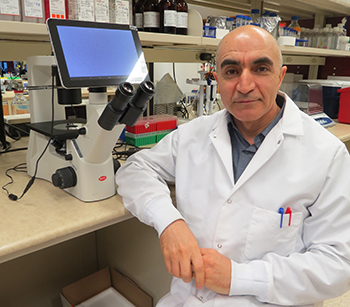
Immunologist Shokrallah Elahi's research shows reducing chronic inflammation in HIV infected individuals can improve their quality of life.
Reducing chronic inflammation in HIV infected individuals could have them living longer and enjoying an improved quality of life.
New research from the University of Alberta's School of Dentistry is giving important insight into improving treatment options for people living with HIV. The study, Atorvastatin restricts HIV replication in CD4+ T cells by upregulation of p21 published in AIDS (Official Journal of the International AIDS Society), shows that anti-inflammatory drugs may prevent accelerated aging in HIV infected individuals.
"HIV infected individuals experience accelerated aging in different organs as the results of chronic inflammation and elevated immune activation in them," says Shokrollah Elahi, lead author of the publication and immunologist at the School of Dentistry. "If you reduce chronic inflammation, you can enhance their quality of life, and of course, expand their life expectancy."
With the availability of antiretroviral therapy (ART) for HIV infected individuals, HIV infection has become a chronic disease. This chronic inflammation state has been linked to rapid aging in HIV-infected individuals. As a result, patients are now facing a new set of challenges such as increased rates of cardiovascular disease, stroke, kidney and liver disease, osteoporosis, neurological disease, and non-AIDS-defining malignancies, many of which are more typical of an aging population.
It has been shown that HIV-infected individuals compared to uninfected persons have much higher levels of inflammation within their body despite the ART.
"Human HIV infection is suppressed but not eliminated by the current medication. As a result, viral persistence in the presence of ART is a major source of inflammation and substantial immune activation, both of which are linked to 'inflammaging' - a concept that attributes to the aging process in HIV-infected individuals," says Elahi. "Our study shows that cholesterol-lowering medication can reduce inflammation and makes CD4 T cells (HIV target cells) less permissible to HIV infection."
The study shows that the most commonly used cholesterol-lowering medication, atorvastatin (Lipitor), effectively reduces immune activation, thereby diminishing systemic inflammation which leads to premature or accelerated aging.
HIV infection also causes lipid abnormalities such as high cholesterol level in patients. Therefore, HIV-infected individuals could benefit from this property of atorvastatin. Interestingly, we have discovered that this drug reduces HIV replication by a novel mechanism, in fact makes CD4 T cells more resistant to HIV infection.
Elahi says further clinical trail studies may lead researchers to new therapeutic options to more effectively reduce the inflammatory state, and thus, benefit the health of HIV-infected individuals by preventing accelerated aging.